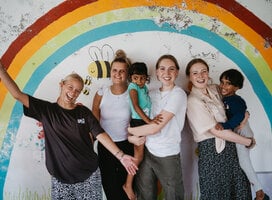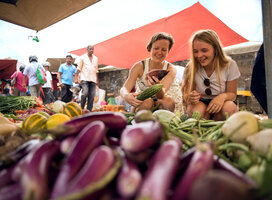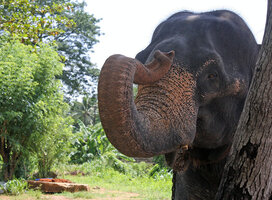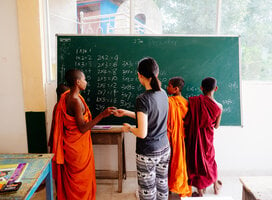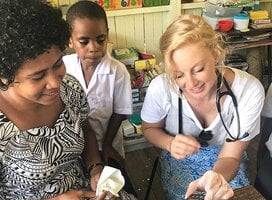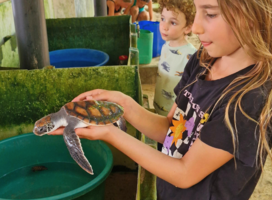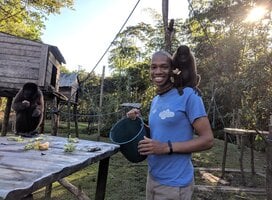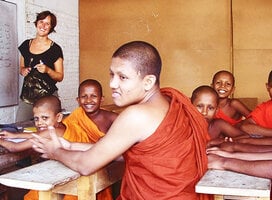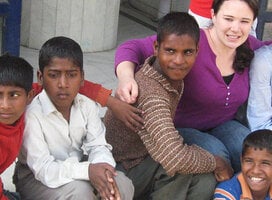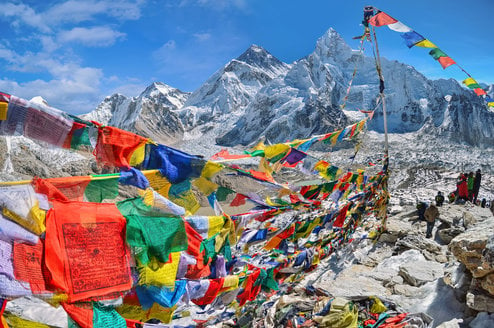Gap Year Programs in Sri Lanka
Sri Lanka’s recorded history spans 3,000 years and is known for its natural beauty and historical sites. Marco Polo described Sri Lanka as “the finest island of its size in all the world.” Sri Lanka is home to a rich Buddhist culture, with 70% of the population practicing Buddhism. From the beaches, wildlife, religions, native dances and handicrafts, Sri Lanka has something to offer every traveler.
Volunteering
Sri Lanka has a variety of exciting volunteer opportunities. Animal lovers can spend a year observing and recording the habits of wild elephants or ensuring the welfare of endangered turtles. Those with an interest in Buddhism can volunteer to teach English in monasteries to the monks. Those interested in community development can find programs helping to rebuild communities and promoting education for women and children.
Teaching
With an increased contribution to the GDP from tourism, English is becoming an increasingly vital skill for people in Sri Lanka. There are opportunities for teaching English in public schools and private international schools. Teaching salaries in Sri Lanka tend to be very low so it is best to research the cost of living where the school is located. You can learn more about teaching in Sri Lanka here.
Adventure Travel
Sri Lanka is a wonderful compact island with much to explore. Sri Lanka is home to many beautiful beaches and national parks. The diverse wildlife, dazzling waterfalls and fascinating botanical gardens make it a desirable place for nature lovers.
Intern
Internships in Sri Lanka may range from a few weeks to a year. Applying through an internship provider is probably the safest way to secure an internship in Sri Lanka. You can learn more interning programs and providers here.
Cost of Living
Living costs in Sri Lanka are relatively low. Prices will range depending on the region you are located in and the type of housing you are looking for. The cost for a one-bedroom apartment in the city will run about $300 dollars a month. However, the cost outside the city may only be $140 a month for a 1-bedroom apartment. You can learn more about Sri Lanka’s daily living cost at Numbeo.
Culture and Etiquette
Freedom of religion has been historically upheld in Sri Lanka’s history. Sri Lanka’s culture has been largely influenced by Buddhism and Hinduism. These major religious influences have greatly helped to shape the culture, politics and everyday life of Sri Lankans.
Sri Lankan citizens are known for being friendly and respectful. They pay close attention to social status and will address other with the proper title. Handshaking is the most common form of greeting, but women will often decline to shake hands with a male outside of the family. Sri Lankans are typically non-confrontational and will communicate in all politeness without directly saying “no.” It is important for travelers to listen and read between the lines to ensure no feelings are hurt.
In a business setting, building a relationship is a key element. Most Sri Lankan companies will use the first meeting to initially take the steps to form a relationship. Closing a business deal is made through creating good rapport and mutual respect between the parties.
Health and Safety
It is generally recommended to anyone traveling to Sri Lanka to obtain travel medical insurance for the duration of their trip. Common mosquito borne illnesses found in Sri Lanka include: mosquito-dengue fever, malaria and Japanese encephalitis. Vaccinations are available to help prevent malaria and Japanese encephalitis, but no vaccine exists for dengue fever.
Foodborne, waterborne and other infectious diseases occur from time to time in Sri Lanka. Drinking water that has been boiled is a safety measure that can be taken to help prevent illness or disease.
